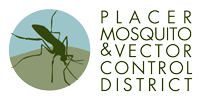
At Placer Mosquito, our applied research program uses scientific investigation to improve the efficacy or efficiency of specific District operational goals. There is always more to learn about vectors and how to keep people safe from them. In order to continue to improve and use limited resources most productively, we constantly identify and assess opportunities to improve. By investing in research and innovation opportunities, the District can continue to address on-going threats and stay ahead of new challenges in a constantly changing landscape.
Current Applied Research Projects
The Good Neighbor Project
This project assessed different backyard habitats for their suitability for supporting invasive mosquito (Aedes aegypti) populations. Since the first Aedes aegypti detection in Placer County in 2019, we have worked to understand where we might expect to see more infestations and if there are differences between lot size, house construction date and types of water-holding objects or structures on the property. This project also allowed our staff to practice backyard Aedes aegypti inspections which are quite different from other mosquito species inspections and require new skills.
CO2 Trap Modifications to Improve Trap Result Consistency and Sampling Efficiency
District staff are designing, constructing and testing modifications to improve delivery of CO2 attractant in adult mosquito traps and increase the District’s ability to take samples of mosquitoes more efficiently.
Establishing Operational Parameters for Liquid and Granular Larvicide Applications by Unmanned Aerial Systems
Applications of mosquito control insecticides from a UAS is a novel and promising new tool to protect public health. With any new spray technology, best practice is to establish baseline parameters for applications like altitude, speed, spray nozzle, flow rate, swath, etc. Placer Mosquito is working to evaluate the common liquid and granular mosquito larvicides currently available to establish these baseline parameters for the DJI AGRAS-MG1s spray drone.
Development and Evaluation of Baiting Strategies for Control of Pest Yellowjackets in California – Collaboration with University of California Riverside
This project, in its final year of a three-year collaboration with UCR and other partners, studies and evaluates baits to control yellowjacket pest species.
Past Applied Research Projects
Mosquito Assessment and Control Unmanned Aerial Systems
The MAC-UAS project was a pilot project to evaluate use of Unmanned Aerial Systems, drones, for mosquito habitat assessment, mosquito larvae detection in water and mosquito control insecticide application.
Buettner, J, Schon, S, Ortiz, E, & Boisvert, M (2018) Mosquito assessment and control using unmanned aerial systems (MAC-UAS): program development at Placer Mosquito and Vector Control District, Proceedings of the Mosquito and Vector Control Association of California, 86, 53-57, https://www.mvcac.org/amg/wp-content/uploads/MVCAC-Proceedings-Full-2018.pdf
Evaluation of Aerial Adulticide Mosquito Efficacy
This project developed and tested a standardized efficacy testing and analysis protocol for evaluating aerial adult mosquito treatments.
Hartle, J, Sorensen, M & Boisvert, M (2018) Evaluations of aerial ultra-low volume mosquito adulticide applications in Placer County, California, Proceedings of the Mosquito and Vector Control Association of California, 86, 50-52, https://www.mvcac.org/amg/wp-content/uploads/MVCAC-Proceedings-Full-2018.pdf
Evaluation of Automated Mosquito Counting Traps
This project tested the operational performance of the BG-Counter, an automatic counting adult mosquito trap and evaluated data produced from the BG-Counter to improve our ability to assess timing and location of mosquito treatments.
Boisvert, M, Hartle, J, Sorensen, M & Buettner, J (2018) BG-Counter: a very efficient multi-task tool, Proceedings of the Mosquito and Vector Control Association of California, 86, 71-73, https://www.mvcac.org/amg/wp-content/uploads/MVCAC-Proceedings-Full-2018.pdf






